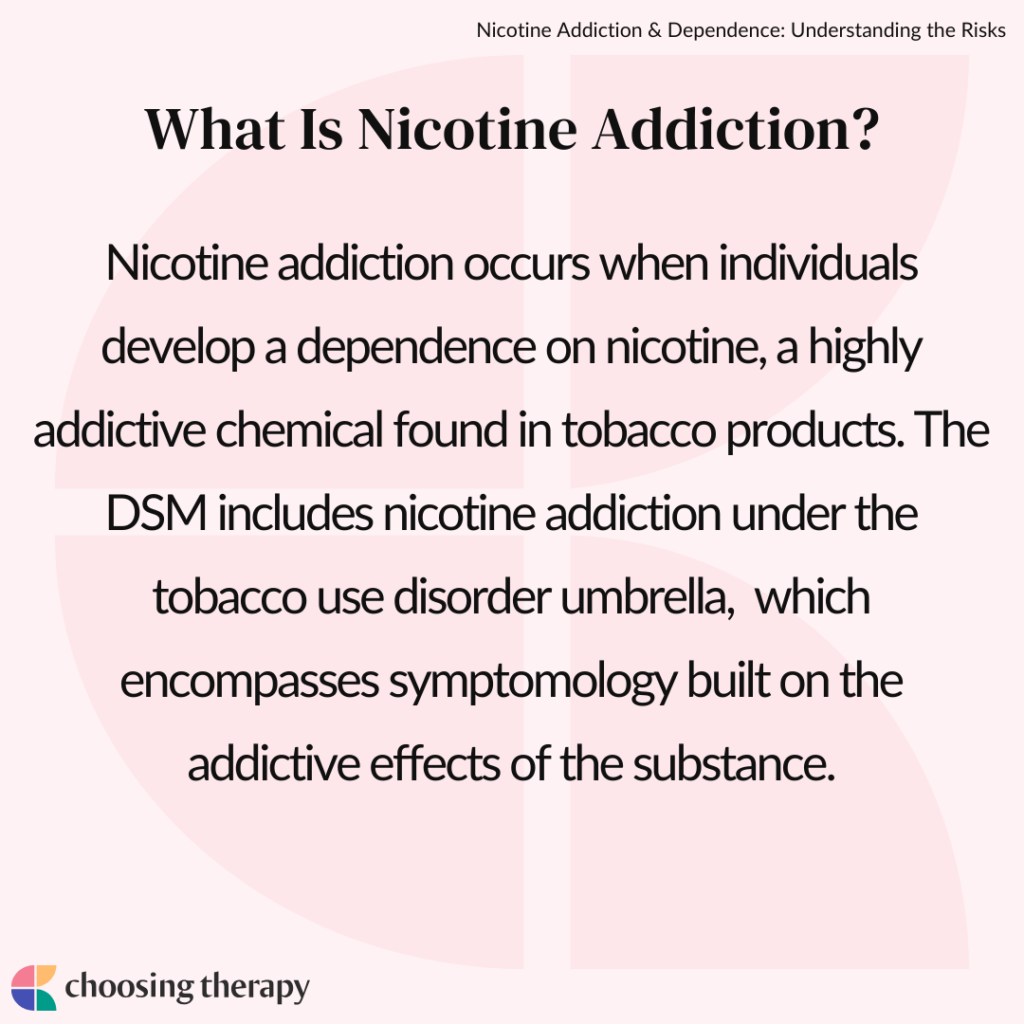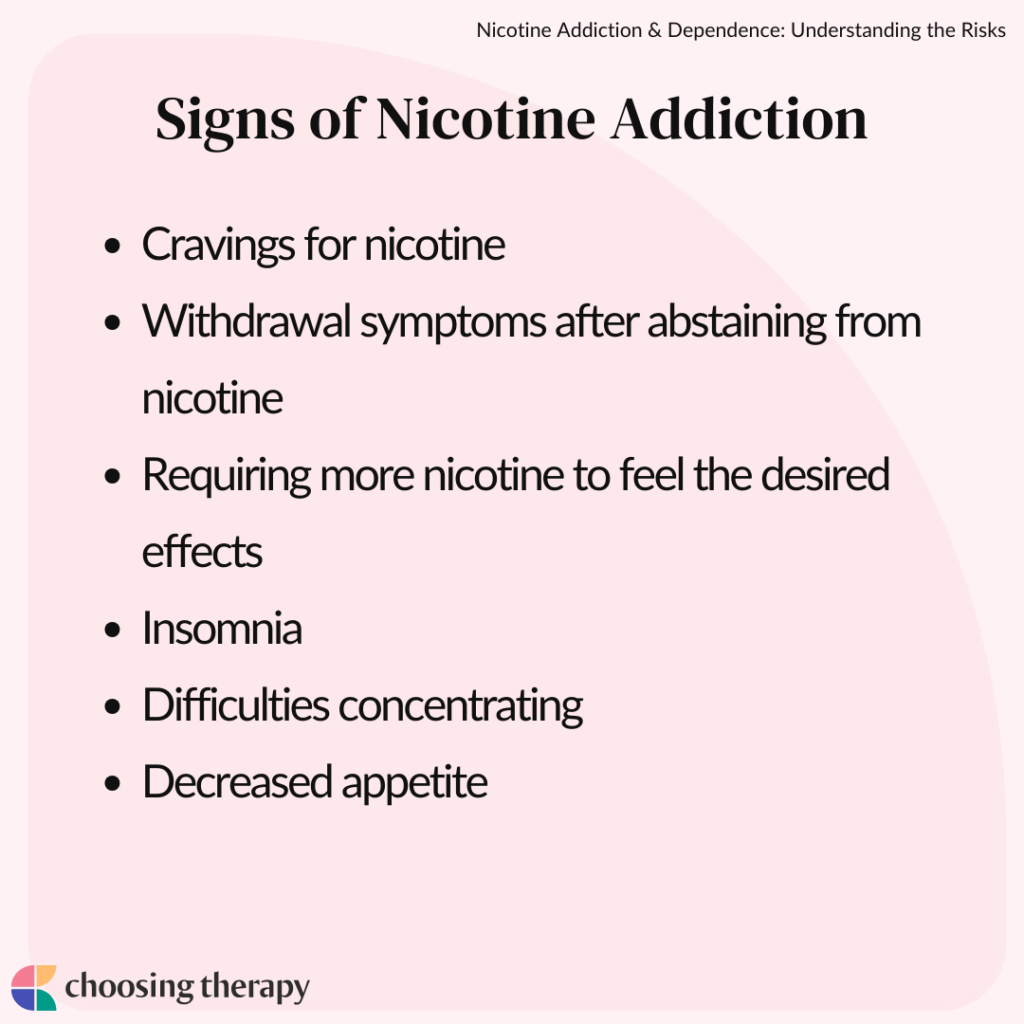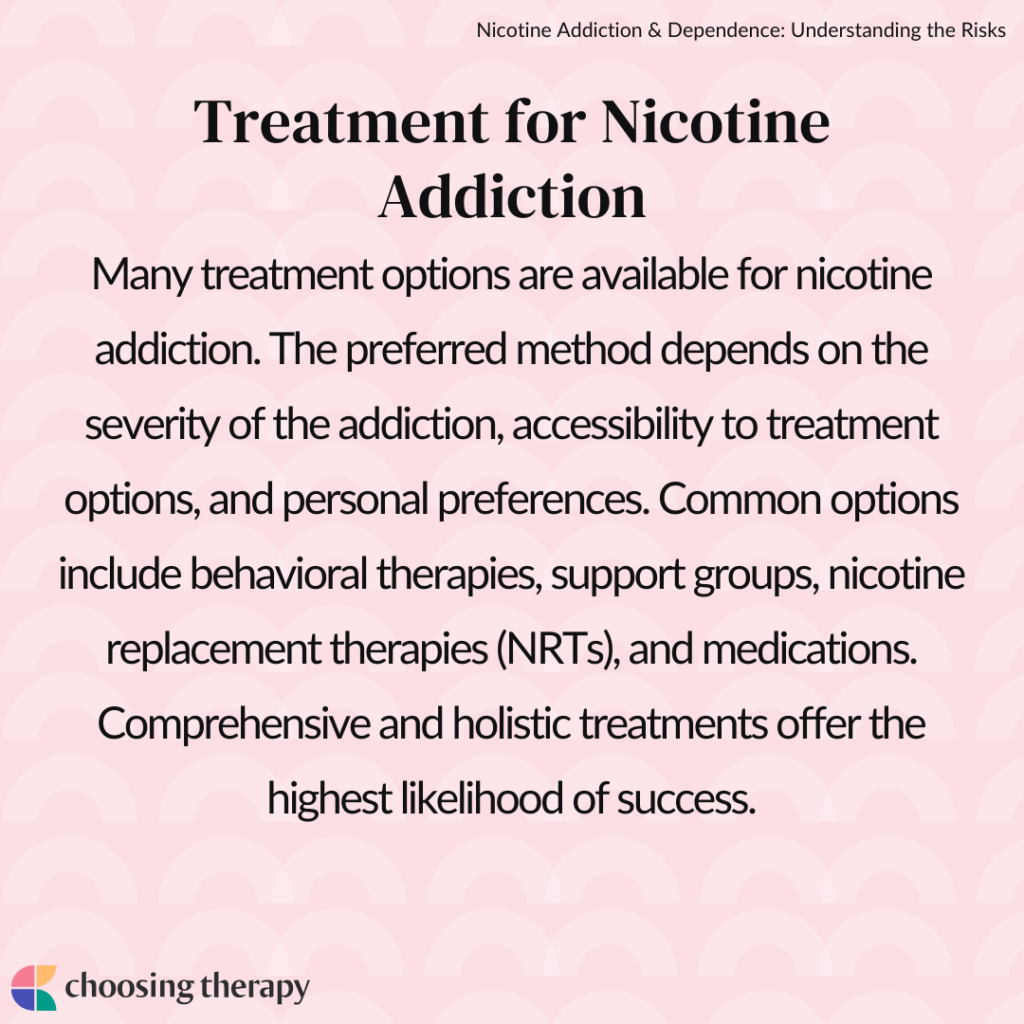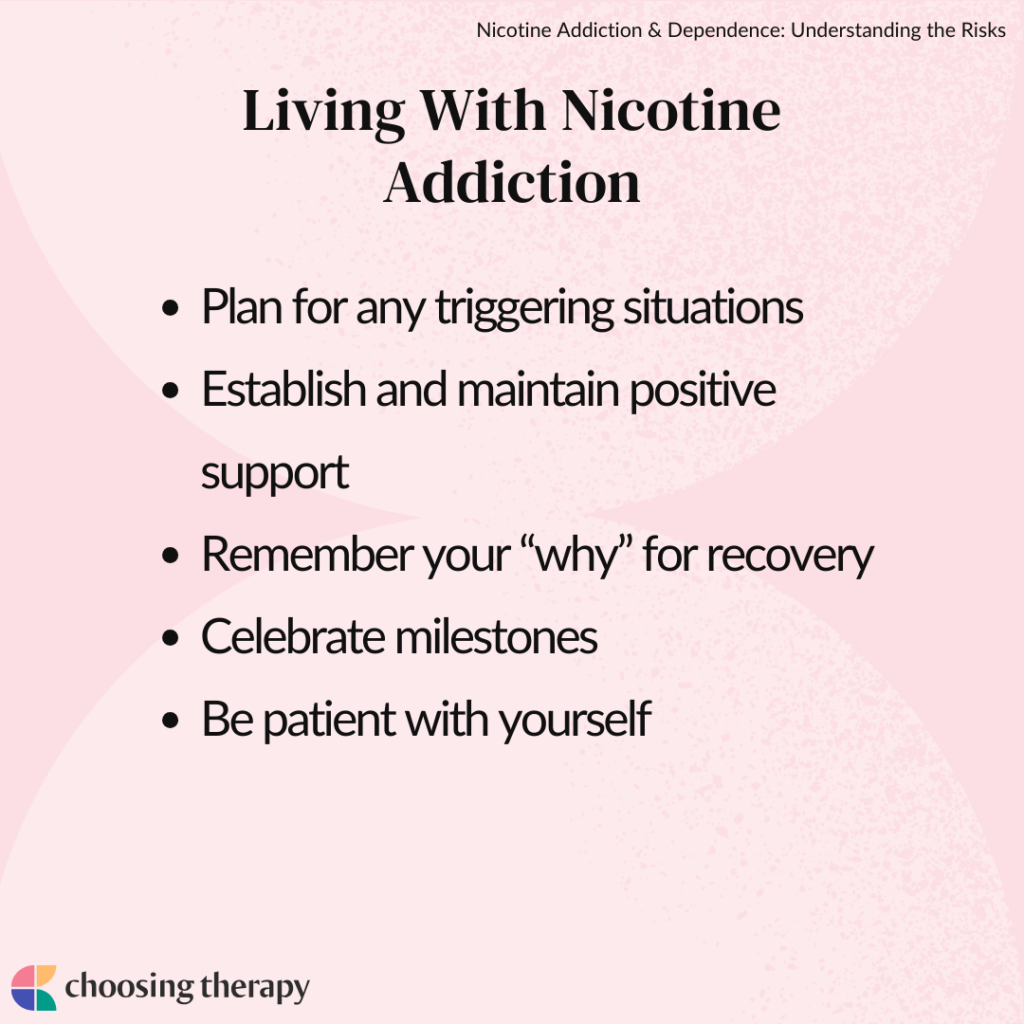Nicotine addiction is a physiological, cognitive, and emotional dependence on nicotine. What makes nicotine addictive may come from how it affects the brain and reward systems. Smoking cessation treatment, medications, and support are readily available for those ready to quit.
Quit Smoking With Relay Relay is a group-based, digital recovery program for mastering compulsive smoking. Try It Free
What Is Nicotine Addiction?
Nicotine addiction occurs when individuals develop a dependence on nicotine, a highly addictive chemical found in tobacco products. The DSM includes nicotine addiction under the tobacco use disorder umbrella, which encompasses symptomology built on the addictive effects of the substance.1 Individuals can consume nicotine in cigarettes, cigars, chewing tobacco, dip, and snuff.
Why Does Nicotine Dependence Occur?
Nicotine is an addictive substance in any form. Like other drugs and alcohol, nicotine activates the brain’s reward center and nicotinic receptors that release dopamine.2 This sensation leads to the euphoric “buzz” many nicotine users experience. Individuals must consume more of the drug to get this “high” as their tolerance increases.
Prolonged and frequent nicotine consumption can create additional nicotine receptors, and research suggests those addicted to smoking have billions more receptors than non-smokers.2 Pleasure from nicotine consumption ceases when one stops using, contributing to withdrawal symptoms, difficulty concentrating, restlessness, depressed mood, and insomnia.1
Signs of Nicotine Addiction
Nicotine addiction or dependence can affect individuals differently, and the severity of these symptoms often varies from person to person. However, common signs across populations include intense cravings, decreased appetite, and sleep disturbances.
Below are common signs of nicotine addiction and dependence:
- Cravings for nicotine
- Withdrawal symptoms after abstaining from nicotine
- Requiring more nicotine to feel the desired effects
- Insomnia
- Difficulties concentrating
- Decreased appetite
Nicotine Addiction Symptoms
Nicotine addiction manifests through various physical and psychological symptoms. Individuals dealing with addiction struggle to cut back despite consequences and health impacts. Prolonged nicotine consumption can create physical dependence, and many may experience withdrawal when they stop using tobacco products.
Symptoms of nicotine addiction include:
- Consuming nicotine in larger amounts over a longer period than intended
- Persistent desire or unsuccessful attempts to cut down or control nicotine consumption
- A great deal of time is spent obtaining and consuming nicotine
- Craving or strong urge to use nicotine
- Recurrent nicotine use resulting in a failure to fulfill major obligations
- Continuing nicotine use despite persistent or recurrent problems caused or exacerbated by its effects
- Giving up or reducing important social, occupational, or recreational activities
- Recurrent nicotine use in physically hazardous situations
- Increased tolerance
- Withdrawal symptoms after nicotine consumption ends
What Causes Nicotine Addiction & Dependence?
Possible nicotine dependence causes vary by individual but often relate to biological, social, and psychological factors. Anyone can get addicted to nicotine, but specific triggers and predispositions are associated with addiction. The more causes and triggers present, the more vulnerability increases.
Causes and triggers for nicotine addiction may include:
- Genetic predisposition: A family history of substance abuse places some individuals at a higher risk of developing addiction when exposed to nicotine.
- Having a social network of nicotine users: Being surrounded by friends, family, or colleagues who use nicotine can influence and normalize smoking behavior, increasing the likelihood of nicotine addiction.
- Easy access to nicotine: Easy access to nicotine products, such as cigarettes or vaping devices, makes it more convenient for individuals to start and sustain their nicotine addiction.
- Chronic stress: Chronic stress can lead individuals to use nicotine as a coping mechanism. Nicotine can temporarily relieve stress and anxiety but also contribute to a cycle of addiction.
- Boredom: Nicotine use may become a way to alleviate boredom or to fill empty time, leading to addiction.
- Experiencing trauma or loss: Individuals who have experienced trauma or significant loss may turn to nicotine as a means of self-medication or coping with emotional distress.
- Being diagnosed with a mental health condition: Certain mental health conditions, such as depression or anxiety, can increase the risk of nicotine addiction as individuals may use nicotine to alleviate symptoms.
- Experiencing a co-occurring substance use disorder: Individuals with a history of substance abuse or addiction are at higher risk of developing nicotine addiction, as using multiple substances can reinforce addictive behaviors.
Help For Addiction Ria Health: Effective, Evidence-Based Alcohol Treatment 100% Online Quickly change your relationship to alcohol with our at-home program. On average, Ria Health members reduce their BAC levels by 50% in 3 months in the program. Services are covered by many major health plans. Visit Ria Health Workit Health – Online Treatment for Opioids or Alcohol, Including Medication. Modern, personalized recovery that combines medication, a supportive community, and helpful content. Covered by many insurance plans. Currently available in FL, TX, OH, MI, and NJ. Visit Workit Health Best Drug Addiction Rehab Centers – Find the best local detox or drug rehab center covered by your health insurance. Search by location, condition, insurance, and more. Read reviews. Start Your Search
Side Effects of Nicotine Use & Addiction
Nicotine dependence and addiction can have numerous side effects, such as cardiovascular disease, respiratory issues, cancer, and oral health problems. Prolonged nicotine and tobacco abuse significantly increases the risk of long-term health implications.
Below are possible side effects of nicotine addiction:3
- Coronary heart disease
- Stroke
- Reduced blood flow to legs and skin
- Lung cancer
- Worsened asthma symptoms
- Chronic obstructive pulmonary disease (COPD)
- Additional cancers
- Birth defects
- Reduced fertility
- Tooth decay
- Type 2 diabetes
- Decreased immune functioning
- rheumatoid arthritis
Nicotine Withdrawal Symptoms
Individuals may experience withdrawal symptoms when they attempt to quit or significantly reduce their nicotine intake. These symptoms can vary in intensity and duration but commonly include headaches, dizziness, increased appetite, gastrointestinal disturbances, and changes in sleep patterns.
The psychological effects of nicotine withdrawal can also be distressing, and many people struggle to cope with intense cravings, irritability, restlessness, and anxiety. Withdrawal can leave individuals feeling depleted of motivation to achieve recovery, sometimes resulting in relapse or a return to tobacco consumption.
Below are common withdrawal symptoms associated with nicotine addiction:4
- Intense cravings for nicotine
- Irritability
- Restlessness
- Sleep disturbances
- Weight gain
- Increased appetite
- Anxiety
- Increased depression or sadness
Treatment for Nicotine Addiction
Many treatment options are available for nicotine addiction. The preferred method depends on the severity of the addiction, accessibility to treatment options, and personal preferences. Common options include behavioral therapies, support groups, nicotine replacement therapies (NRTs), and medications. Comprehensive and holistic treatments offer the highest likelihood of success.
Therapy for Nicotine Addiction
Therapy for nicotine dependence may focus on the biological, psychological, and social factors contributing to the addiction. Cognitive behavioral therapy (CBT) for addiction explores negative beliefs, thoughts, and behaviors to help clients address underlying issues associated with nicotine use.
Motivational interviewing (MI) is a common treatment approach for substance use disorder and may help assess how motivated an individual is to change. If they are not motivated, the focus will be on educating them about the harm of nicotine and determining what can serve as motivation. In other cases, specially trained and certified hypnotherapists may offer hypnotherapy to help individuals stop smoking.
Medications
NRTs and specific medications have demonstrated positive outcomes for nicotine cessation. Professionals often recommend these methods as part of a treatment regimen. Commonly used NRTs include nicotine gum, transdermal patch, nasal sprays, inhalers, and lozenges.5
Medications for nicotine addiction and dependence may include bupropion (Zyban) and varenicline (Chantix).5 Consult a physician before taking any over-the-counter or prescribed medications.
Smoking Cessation Treatment In as little as 15 minutes, you can speak with a board-certified doctor from PlushCare to acquire smoking cessation treatment online.
Living With Nicotine Addiction
Though relapse is highly probable in nicotine addiction recovery, redirect yourself back on track when possible. Remember, every cutback is a step in the right direction, and effective relapse prevention plans can help your healing journey.
Consider changing “persons, places, and things” associated with nicotine use. At the very least, distance yourself from nicotine-related products and devices. The more you can remove potential triggers, the greater the likelihood of success. The keys to any recovery effort are intention and consistency.
Below are ways to cope with nicotine addiction:6
- Plan for any triggering situations: Identify triggers for nicotine use and prepare accordingly. For example, consider declining social activities if you know others will be smoking or using tobacco products.
- Establish and maintain positive support: Be honest with your social network and let them know you would appreciate their support as you quit smoking.
- Remember your “why” for recovery: Consistently remind yourself why you quit smoking and review literature that supports those thoughts.
- Celebrate milestones: Treat yourself when you achieve certain milestones (e.g., one week, month, year abstained). Doing so can provide motivation during challenging times.
- Be patient with yourself: Recognize that cravings are temporary and will pass. Utilize positive self-talk, structured breathing exercises, and other healthy coping skills to stay on track. Focus on positive thoughts that reinforce quitting.
Final Thoughts
Nicotine addiction can significantly impact both physical health and mental well-being. Recognizing the causes and triggers of nicotine addiction can help individuals make informed decisions about their nicotine use and seek appropriate support and treatment. Quitting nicotine can be challenging, but overcoming addiction is possible with the right care and intervention.
To help our readers take the next step in their mental health journey, Choosing Therapy has partnered with leaders in mental health and wellness. Choosing Therapy is compensated for marketing by the companies included below. Online Treatment for Opioids or Alcohol, Including Medication. Workit Health – Modern, personalized recovery that combines medication, a supportive community, and helpful content. Covered by many insurance plans. Currently available in FL, TX, OH, MI, and NJ. Visit Workit Health Alcohol Treatment – Cut Back or Quit Entirely Ria Health – Quickly change your relationship to alcohol with our at-home program. On average, members reduce their BAC levels by 50% in 3 months in the program. Services are covered by many major health plans. Visit Ria Health Drug Addiction Rehab Centers Recovery.com – Find the best local detox or drug rehab center covered by your health insurance. Search by location, condition, insurance, and more. Read reviews. Start Your Search Telehealth Treatment For Opioid Use Disorder Bicycle Health – offers therapy, support, and medication for addiction treatment (MAT). MAT offers the lowest relapse rates for opioid use disorder, helping people to stop using opioids with minimal physical discomfort. Covered by most major insurance. Visit Bicycle Health Drinking Moderation Sunnyside – Want to drink less? Sunnyside helps you ease into mindful drinking at your own pace. Think lifestyle change, not a fad diet. Develop new daily routines, so you maintain your new habits for life. Take a 3 Minute QuizAdditional Resources
Best Online Medication-Assisted Treatment Programs Online medication-assisted treatment programs are fairly new to the telehealth industry, but existing companies are expanding quickly with new programs emerging every day. It’s important to explore your options and understand the level of virtual care available so you can choose the best addiction treatment program for you.
Best Mindful Drinking Apps If you’re thinking about joining the sober curious movement and you’d like to cut back on drinking, mindful drinking apps are a great place to start. Practicing mindful drinking can take some time, attention, and patience, but with the help of the right app, you can completely transform your relationship with alcohol.








